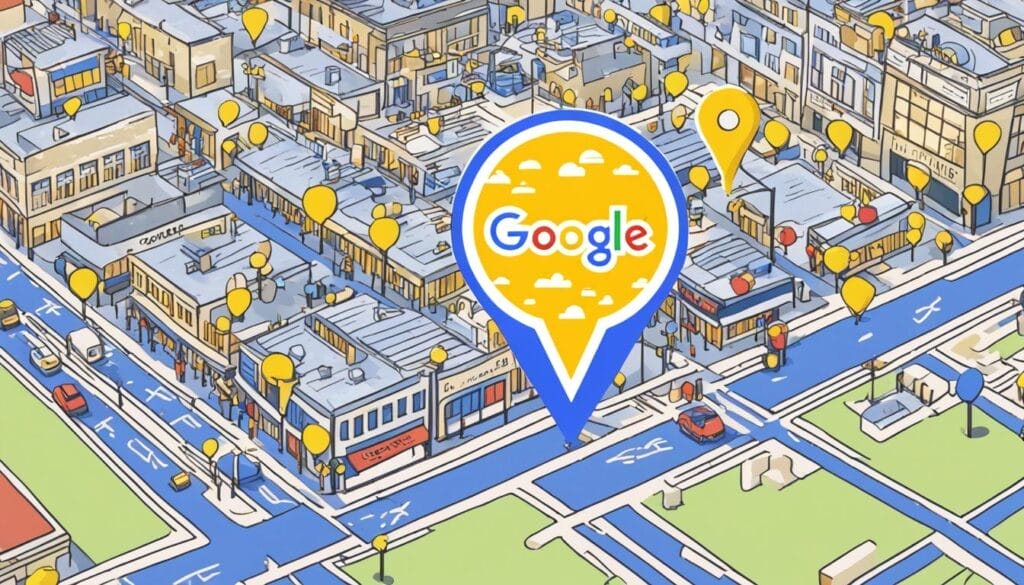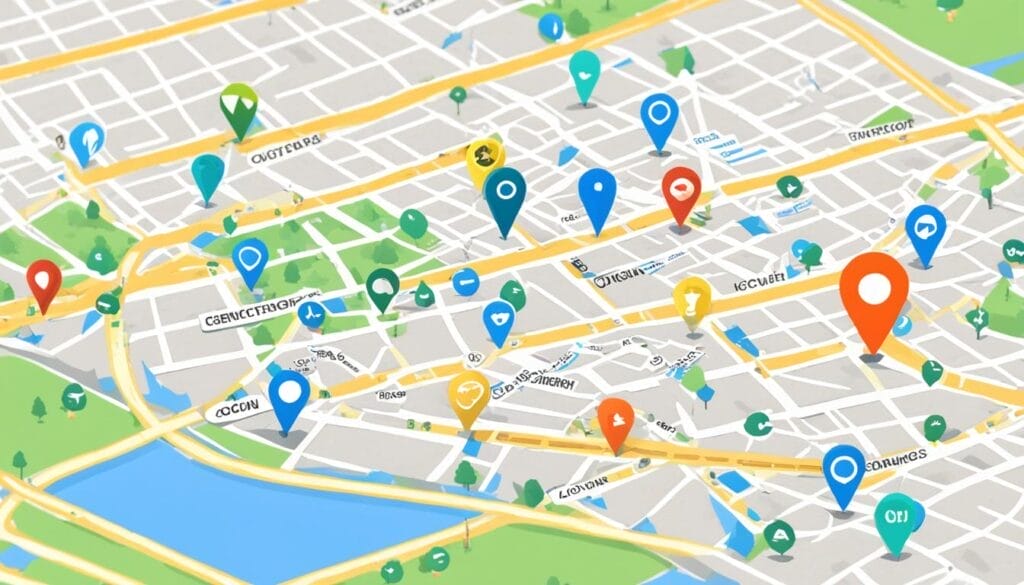Did you know that 46% of all Google searches are looking for local information? That means nearly half of all searches are local. It’s very important for UK businesses to make their SEO local-friendly. This helps them beat the competition.
SEO for local directories is essential for getting the right people to visit your business online. When your business shows up in local searches, you draw in customers seeking what you offer nearby. I’ll show you how to boost your local SEO. This way, your business will shine in local directories.
Key Takeaways:
- Local SEO matters a lot for UK businesses since 46% of Google searches are local.
- Making your SEO local-friendly attracts people who want what you offer in their area.
- Being seen in local searches boosts your online presence and brings in the right visitors.
- With smart local SEO tactics, your business will stand out online.
- High ranks in local searches help you be more visible to local folks and beat rivals.
The Basics of On-Page SEO for Local Businesses
On-page local SEO makes a website more visible in local searches. It focuses on optimising elements like meta titles, descriptions, and site copy with local keywords.
Meta titles and descriptions are key. They summarise your page’s content for search engines. Including local keywords here shows your page’s relevance to local searches.
Headers are vital too. They organise your content, making it easy for search engines to see what’s important. Using local keywords in headers boosts local search visibility.
Don’t forget on-page site copy. Creating local content like FAQs and blog posts helps with “near me” searches. This meets customer needs and improves local SEO.
Formatting Title Tags for Geolocation
Title tags should include the location for local searches. For instance, a London bakery might use “Best Bakery in London” in its title tags. This shows search engines the site’s local relevance.
Localised content is key for attracting local customers. By properly using meta titles, descriptions, headers, and local keywords, businesses shine in local search results.
Leveraging Google Business Profile
Google Business Profile (GBP) is key for local SEO. Claiming and verifying your GBP (formerly known as Google My Business) listing helps control your business info on Google search results and Maps. This increases your visibility locally.
To improve your visibility, ensure your NAP (name, address, phone number) is accurate and the same everywhere. This makes search engines trust your business more, improving your rankings in local searches.
Don’t stop at the basics. Use all GBP features to boost your online appearance. Add your website, business hours, and an eye-catching description. These details help potential customers and show your professionalism.
Customer reviews on GBP are vital. Ask happy customers to leave positive feedback. Good reviews increase your credibility. Replying to all reviews shows you value customer feedback and aim for top service.
GBP lets you shape your online image. Optimise your business info, encourage reviews, and engage with your audience. This will enhance your local SEO impact and keep you ahead.
Benefits of Leveraging Your Google Business Profile:
- Increased visibility in local search results and Google Maps.
- Control over how your business information appears online.
- Improved local SEO rankings through optimised business information.
- Enhanced credibility and trustworthiness through customer reviews.
- Active engagement and commitment to customer satisfaction.
| Feature | Benefits |
|---|---|
| NAP Consistency | Boosts local search rankings and avoids confusion. |
| Website URL | Drives traffic to your website and increases online visibility. |
| Business Hours | Provides convenient information to potential customers. |
| Business Description | Highlights your unique selling points and expertise. |
| Customer Reviews | Builds trust and credibility for your business. |

Effectively using your free Google Business Profile puts you in charge of your online image. It drives customers to you. Maximise this tool to boost your visibility and stay ahead of competitors.
Building Local Citations
Local citations are vital for improving a business’s presence online. They involve listing a business’s NAP details (name, address, phone number) on various external sites and directories.
Keeping NAP data consistent is crucial. It helps avoid confusion and keeps your listings accurate. This consistency builds trust with search engines and future customers.
Getting your business listed on respected online directories boosts local SEO. Focus on directories that fit your industry and attract your target audience. Good places to start are industry-specific directories, local business groups, and government sites.
SEO for Local Directories is all about focusing on the quality of citations is more important than quantity. Aim for directories that are well-known and respected.
Gaining online mentions and backlinks
Gaining mentions and backlinks from local press is also key to enhancing SEO. Being featured on notable local news sites or blogs tells search engines your business is credible and locally relevant.
“Local publications boost your credibility and search rankings. Work with local press to share your insights or special offers. This gains you valuable backlinks and extends your local reach.”
Another tactic in creating SEO for local directories is to partner with local businesses that complement yours. Such partnerships are mutually beneficial. They lead to co-marketing opportunities, increasing both visibility and local customer interest.
Building local citations is essential for SEO. Ensure NAP consistency and list your business on reputable directories to boost visibility and attract targeted customers. Also, getting online mentions and forming local business partnerships strengthen your local SEO authority.
Harnessing Online Reviews and Reputation Management
Online reviews greatly affect how people decide to buy. As someone who runs a business, I know how important it is to listen to what customers say. Their feedback shapes my online reputation. I work to get them to share their thoughts on big sites like Google, Yelp, and Facebook. This not only helps others see us as credible but also helps our place in search results.
When customers leave reviews, it means they care. I make it a priority to reply quickly. This shows I value their satisfaction and involvement. By engaging with both types of feedback, I highlight my aim to solve any problems. This enhances our brand’s image.
“It’s not just about receiving positive reviews; it’s also about how you manage the negative ones.”
– Paul Nightingale SEO Expert
Managing my online rep means keeping an eye on bad feedback too. By dealing with customer concerns fast, I show my commitment to top-notch service. It’s important to protect my brand’s image to keep a positive online presence.
Reputation management is all about consistency. By watching online reviews and feedback regularly, I understand what my customers experience. This helps me act on any issues quickly.
Using online reviews well can boost my brand, build customer trust, and help our search rankings. Online feedback. It’s a key piece of growing a successful business.

Having looked at online reviews and reputation management, we’re set to dive into the next topic. That’s Mobile Optimisation and Voice Search. This part will tackle the need for being mobile-friendly and optimising for voice search in the digital world.
Mobile Optimisation and Voice Search
Smartphones and voice assistants have changed how we look for information. Mobile optimisation and voice search optimisation are now vital. They help websites cater to these new trends. This makes for a better user experience.
Mobile optimisation makes a website work well on different devices. This includes smartphones and tablets. It makes sure the site looks good on small screens. Users can navigate easily. Mobile-friendly sites get better rankings in search results.
Having a responsive design is key for mobile optimisation. It lets a website adjust its layout for any screen size. Every visitor gets a good experience, no matter the device. This saves the need for different website versions, which is both efficient and cost-effective.
Voice search optimisation is also essential now. Voice assistants like Siri, Alexa, and Google Assistant are popular. They make people use voice commands to find information. This means websites must use natural, conversational language in their content. It helps match how people naturally talk.
Accelerated Mobile Pages (AMP)
AMP can also boost a website’s performance on mobile. It’s an open-source framework that makes websites load faster on mobile devices. Fast-loading websites are likely to rank better in search results. They also attract more mobile visitors.
To succeed in mobile optimisation and voice search, understand user behaviour. Offer a smooth experience on all devices. Use responsive design, conversational keywords, and AMP. This prepares your website for the mobile-first world.

| Benefits of Mobile Optimisation and Voice Search | Benefits of AMP Implementation |
|---|---|
|
|
Content Marketing for Local SEO
Content marketing changes the local SEO game. By crafting content that speaks to local people, businesses gain credibility. They show off their know-how and pull in the right customers.
Using local keywords in your content is vital. It lets businesses aim at local searches and climb up in rankings. This means more local users find them easily.
Also, social media is key for spreading the word. Posting helpful content on Facebook, Twitter, Instagram, and LinkedIn draws in locals. It also boosts sharing.
“Content marketing allows businesses to establish credibility, showcase expertise, and attract targeted local customers.”
Not just organic sharing, targeted local ads on social media also work wonders. These ads improve visibility and reach more local folks.

Content marketing is a strong strategy for local SEO. Making content that’s engaging and aimed at locals boosts your online spot. It draws local customers and sets you up as a leader. Using local keywords, social media, and targeted ads all help in winning at local SEO.
Summing Up SEO for Local Directories
Local SEO is very important for businesses in the UK that want to be seen online. It helps websites show up better in local searches. This makes it easier for companies to stand out and reach the people they want to.
To use SEO well, businesses should focus on making their sites better for local searches. This includes using Google Business Profile, creating local citations, and responding to online reviews. These steps can help a business succeed locally.
It’s also key for businesses to keep up with new online trends. This means making sure websites work well on mobile phones and using keywords that people say out loud in voice searches. Making interesting content for local people is also crucial.
Also, getting local links and being active on social media helps businesses get noticed in their area. This boosts their visibility in local communities.
For businesses in the UK, investing in SEO is a smart move. It leads to a strong online presence, better local search rankings, and draws in the right customers. By using these effective strategies, businesses can really shine in the digital market.
FAQ
What is local SEO?
Local SEO is a way to make your business visible online, based on where people are searching from. It focuses on getting the right customers to find you when they are searching for something local.
What is on-page local SEO?
On-page local SEO makes your website more visible in local searches. It includes tweaking things like titles, descriptions, and content with specific keywords. This helps people find your business easily.
How does Google Business Profile help with local SEO?
Google Business Profile is a key tool for local SEO. By setting up a GBP profile, you control what info shows up in Google searches and Maps. Keeping your GBP information up to date boosts your visibility locally.
What are local citations and why are they important?
Local citations are times your business’s name, address, and phone number appear on other websites. Having consistent citations across the web can help people find you more easily. It also boosts your local search rankings.
How do online reviews impact local SEO?
Reviews greatly influence how people decide to buy. Encouraging customers to leave positive reviews can boost your business’s credibility. It’s also a key factor in improving your local search rankings.
How does mobile optimisation and voice search impact local SEO?
Nowadays, many use smartphones and voice search for finding things online. Making sure your site works well on mobile and is voice-search friendly is crucial for local SEO. It helps people find you easily, no matter how they search.
How can content marketing help with local SEO?
Content that speaks to local issues can help your local SEO. By using local keywords and sharing your content on social media, you’ll draw more local customers. It builds your reputation as a local expert.
Why is local SEO important for UK businesses?
For UK businesses, local SEO is a must to stand out online. It lets you reach your target market right where they are searching. This means more visibility, beating the competition, and connecting with your local audience.





